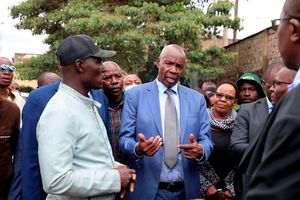Doctors’ strike: Understanding the work of medical interns

Medical interns camp outside Afya House, the Ministry of Health headquarters, in Nairobi on February 12.
What you need to know:
- The medical internship is a mandatory phase for all trained doctors before being licensed, but they perform majority of the roles a licensed one does, but only under supervision.
- The young medics who are often on the frontline to offer healthcare services at medical facilities often deal with the backlog of emergency cases and what would also be termed as standard medical care.
They are arguably the backbone of the healthcare system— they plug staff shortage in public hospitals and are on call 24 hours a day to offer about 70 percent of all healthcare services.
Now, medical interns, their remuneration and terms of services, are at the center of grievances that triggered the ongoing doctors’ strike.
Thursday’s seven-hour meeting convened by Head of Public Service Mr Felix Koskei, failed to hammer a deal on how the 1,200 medical interns will be posted and as they await a full license to practice.
The medical internship is a mandatory phase for all trained doctors before being licensed, but they perform majority of the roles a licensed one does, but only under supervision.
The young medics who are often on the frontline to offer healthcare services at medical facilities often deal with the backlog of emergency cases and what would also be termed as standard medical care.
As the doctor's strike entered its ninth day on Friday, these intern and student doctors enthusiastically took to the streets hoping that their grievances would eventually be heard by the government.
The key issue at hand is posting of the 1,200 inters across the county.
It has emerged that the government that these young doctors are looking up to for a solution has no clue why Kenya Medical Practitioners Pharmacists and Dentist Union (KMPDU) is up in arms over the posting of interns or what exactly medical interns do.
KMPDU on the other hand has relentlessly fought for the posting of interns. The Saturday Nation delve into the controversy by speaking to two interns, about exactly what their jobs entail
"We have agreed the term intern is confusing. Our friends on the other side want all interns to still be called interns and they want them to be paid Sh206,000 as opposed to being paid Sh25,000 like other interns. We now understand they are trained and work it is just that they work under supervision," Mr Koskei said.
But KMPDU Secretary General Dr Davji Atellah says there is a narrow view of the role the intern doctors perform among some government officials at Afya House.
“An intern is a doctor who has graduated, taken an oath, and is employed under supervision. So when you go to the hospital, you work because you are done with all your studies and you took an oath.
"They have accepted that the services that interns offer are 70 percent and in our CBA, it is well defined in job group L and it is in the schemes of service," Dr Atellah said.
During a meeting called by Mr Koskei, and attended by Health Cabinet Secretary Susan Nakhumicha, Treasury’s Prof Njuguna Ndung’u, Florence Bore of Labour and Moses Kuria of Public Service, as well as bosses of the Public Service Commission, Council of Governors and Salaries and Remuneration Commission, the term “intern” and their job description became a bone of contention.
Mr Kosgei argued that pay for interns was harmonised across all professions and questioned why medical interns were paid more than their contemporaries.
"On the issue of internship, we have agreed that the term 'intern' is a bit confusing and we have that in all professions.
"Our friends want them to be called interns and they are paid Sh206,000 as opposed to other interns who are paid between Sh25,000 and Sh35,000 and at the same time (we) absorb all of them at the same time.
"We are saying we want to harmonise payments across the board and because they passionately explained the role of an intern doctor and having realised that an intern doctor is a qualified doctor who has graduated and a doctor who does everything that is required of a doctor when he is posted, only that he is under supervision for a year, we agreed that the term intern may not be appropriate for a doctor because they are qualified and working."
But Dr Atellah, strongly disagreed with the recommendation.
He insists that the existing Medical Practitioners and Dentists Act already provides a clear definition of the term "intern".
“CAP253 of the Act of Parliament states that an intern is a doctor who has graduated, taken an oath, and is working under supervision. In our collective bargaining agreement, it is well defined in job group L. Changing the title does not change the work that they do at the hospitals,” he remarked.
The 2017 Collective bargaining agreement(CBA) signed between the Ministry of Health and KMPDU defines an intern as “an unemployed person with relevant qualifications who has entered into a contract with a government organisation for a period of 12 months with the intent of acquiring relevant work experience for registration with respective professional bodies and/or to increase chances of employability.”
It details that interns sign a contract of employment before kicking off of the internship.
This contract specifies the terms and conditions of service during the period the internship is undertaken.
“As provided for in the Public Service Commission guidelines for internship, the Employment act 2007, the Labour Relations Act 2007 and Human Resources Policy Guidelines 2016, all interns shall sign a contract of employment specifying terms and conditions of service and duration of internship.
"All medical officers, pharmacists and dentists shall be posted to internship centers not later than 30 days from the date of clearance from Medical Practitioners and Dentists Board (MPDB) within the approved establishment,” reads the CBA.
“The Medical Officer, Dental Officer and Pharmacist interns will be compensated a salary equivalent to that of a civil servant in Job Group L, or its converted equivalent and will enjoy all other allowances such as House allowance as per the Deployment station, leave allowance, commuter allowance as per Job Group L.
"The interns shall in addition enjoy all the allowances applicable to them such as Extraneous allowances as per the Job Group and Deployment station, doctor’s allowances ad medical risk allowance. All intern doctors shall work for 40 hours a week,” it adds.
However, interns who spoke to the Nation said they worked beyond the 40 hours, often without breaks, and sometimes being delegated duties that they were relatively inexperienced to handle.
Dr Benjamin Nyariki, a Medical Officer Intern, who works in a Mission Hospital said in a day, he arrives at the hospital before 7am and some days before 6am to see patients before the consultants reports to work between 8am and 8:30am.
Ward rounds start by 9am and run through 1pm or as late as 2pm.
“Thereafter, I have to make follow-ups: order lab and imaging tests and make sure they are done, update families on their relative's status and do an exit round to ensure everything planned for the patients in the morning has been done. This ends at 5pm and sometimes later than this,” he said.
He went on: “If I am on call on a specific day, I will continue working (review patients and admit any new patient through the night until the following morning). I will pre-round on my patients the following morning to present to the consultant the next day like any other normal day. If I am lucky to get a post-call, I will leave after the plans for the patients have been done the following day which will be around 2/3 pm. This cycle continues all week.”
On weekends, all the interns report to work on Saturday morning.
“This is around noon on Saturday. If I am on call on a weekend, I will continue working till Monday after the plans for Monday are done (this means working from Saturday morning till Monday afternoon). If I am not on a weekend call, this is the only time I get to rest,” the intern doctor explained.
“With this cycle, is there time to do other things? No. I have only been home twice 9 months into internship. Am I married? No, I don't even have enough time for a relationship. how old am I again? We treat patients and God heals them. Who cares about my emotional being when I certify three deaths in 24hrs, despite best efforts?” asked Mr Nyariki.
Society demands a lot from a doctor (this weight is more at the internship year) and sometimes forgets that they are also human, the intern doctor says.
“Given what I know now, asked to choose again, would I choose to be a doctor?
"Absolutely! It is a privilege to share stories of patients, support them through their recovery journey, and for those at their final stages of life, to die knowing that someone cared for them.
"For the physical toil, moral injury, and the responsibility of life entrusted to any doctor (foundational year or at professorship level), employing, equipping and paying them is the least the society can do!” he said.
Mr Victor Muchiri, Medical Officer Intern, also termed his experience as quite tough.
“Being the first one to handle patients at the hospital and also being understaffed, we do a lot of work as medical officers, sometimes we work more than 24 hours. We also do night calls, sometimes about three to four times in a week, and if you are understaffed, it is worse.”
“As medical officer interns, we are usually the ones who give the care to the patients. primary, we admit them, and discharge them, in the clinics we are the ones who see them, sometimes, with the support of our seniors.
"We are the primary caregivers in a public hospital, and we are the ones who ensure that the patient has gotten the right access to medical care, and if the intern is not available to do that, then our health in the public hospital is going to go down,” he said.
“My expectation after internship is to find a job. before, the government used to employ us, but now that responsibility has been left to us, “he added.
In 2019, the Kenya Medical Practitioners and Dentists Council (KMPDC), published their national guidelines for internship training of medical and dental officer interns to ensure that medical and dental interns obtain adequate knowledge and skills during their internship periods.
Summary of medical interns' responsibilities:
- Clerking patients and performing relevant investigations
- Guiding patients and relatives with regards to diagnosis, treatment and follow-up.
- Documenting and regularly updating patients’ notes
- Writing accurate and informative case summaries.
- Appropriate handing over patients
- Presenting cases concisely, coherently and competently during ward rounds, grand rounds or any other appropriate fora.
- Participating in the development and implementation of community health programmes under supervision
- Reporting to and consulting with the intern supervisor
- Participating in continuing professional development activities Maintaining professional demeanor and conduct
- Performing any other relevant duties assigned by the supervisor Interns will be expected to go on leave upon completion of the twelve (12) months of rotations as outlined, except under special circumstances in which case they will have to compensate for the time away.
- Providing quarterly reports to the council on the progress of internship on the internship feedback portal:





